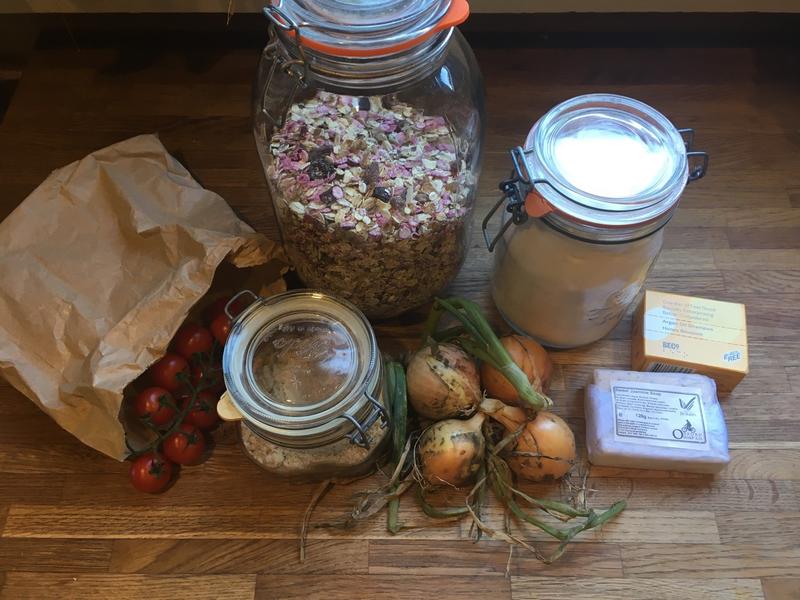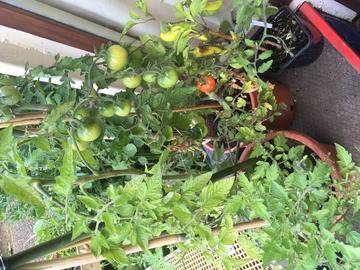Hannah's Plastic Free Favourites
In the last few years I have become really aware of the environmental crisis and my impact on it
I’m sure everyone has seen the images of plastic islands and heard the stories of microplastics entering the ecosystem. I have been trying to reduce my plastic for a while and Plastic-Free July seemed like a great challenge for me to reflect on how successful I could be at reducing my use of plastic this month. Although plastic is so interwoven into our society, I believe that if everyone can make small changes to reduce their plastic, we can very quickly begin to turn the tide on this plastic crisis. Plastic Free July has pushed me to finally do the things I have been talking about for months and I am using this opportunity to share these with you.

A selection of produce from my Cultivate box, reusable jars for filling up at refill shops (found at a car boot sale), soap bars from The Oxford Soap Company and shampoo bar from Beco.
Plastic-Free Toiletries
Although these seem like such a small contribution, when you think about how many shampoo bottles, make-up wipes, hair styling tubs we all throw away (or hopefully try to recycle) each month, it all adds up. This was a big one for me because it actually seemed much easier than tackling plastic wrapped foods. Unlike many food products, I buy toiletries rarely and so I just needed to find new products that I liked just as much. Here are my ideas for reducing plastic in your bathroom:
- Shampoo bars for shampoo – there are so many good brands out there e.g. Lush, Beco, Oxford Soap Company. They are a bit more expensive, but they last a long time and usually contain more natural ingredients. It took a while to find a brand I liked, but now I have I have no need to go back, so I encourage you to keep trying!
- Refillable shampoo and conditioner – if you are not keen on the shampoo bar, there are several places across Oxford that do this including Wild Honey, East Oxford Farmers & Community Market, Flo’s Refill Shop.
- Soap bars for shower gel e.g. I love the ones by the Oxford Soap Company because they smell amazing and they are a local Oxford independent, but you can also buy soap in every other store.
- Natural deodorants – e.g. Native Unearthed, Wild. These are great; they are (again) more expensive, but they last forever and contain natural ingredients. I have had one product for over a year and it is still going strong. They are also much smaller and often are solid, so they are easier to carry in your bag and on planes.
- You can get eco-friendly products* for nearly all your cosmetic or toiletry needs, if you have time to shop around, including floss, toothbrushes, toothpaste etc. I haven’t managed to shift away from plastic versions of these yet, but they are next on my list.
*Sometimes the materials are more environmentally costly in the short term, but I always try to remember that they tend to last longer and that they show businesses that attitudes are changing, so they will be more likely to make even better products in the future!
Plastic-Free Food
Food shopping is a huge contributor to my monthly plastic and it sometimes feels like too big a challenge. It is more time consuming and usually more expensive, but unfortunately, until this is the norm it is unlikely to be the cheaper or easier option. However, things are definitely getting better and easier day by day, especially as new initiatives pop up. You have to spend a bit more time and money in the beginning buying or sourcing containers to store the refills in, but in the long run your cupboard looks more interesting and you throw away fewer plastic packages.
- Use Refill shops more – there are loads of really good refill shop initiatives in Oxford e.g. The Good Fill , OxUnboxed, Waitrose, East Oxford Farmers & Community Market
- Order a weekly veg box from local producers e.g. Cultivate Oxford or even a bigger company like Riverford. These both deliver to your house, but Cultivate can also deliver to Oxford Hub if you prefer (e.g. if you live in college accommodation). This one I’m particularly excited about because Plastic Free July has pushed me to finally do this and I have now ordered a regular veg box (see photograph above).
- Visit local markets to buy fruit and veg, and refill household detergents e.g. Gloucester Green Market or East Oxford Farmers & Community Market
-

Home-grown tomatoes (left) and chilli’s (right)
Grow your own! This is the first year I have decided to grow my own vegetables, spurred on by lockdown, like everyone else. This year I have grown tomatoes, chilli’s (see picture), cucumber, aubergine, bell-peppers, salad and herbs. I never saw myself as much of a gardener, but I have loved growing these vegetables and it’s always exciting cooking with your own food.
- Be conscious when you shop in supermarkets – where do the products come from? Are they in season (many foods can be local but grown out of season in greenhouses)? Are they wrapped in plastic? Are there locally sourced, seasonal, plastic-free alternatives?
Plastic-Free Clothing
Plastic in clothing first came to my attention in the last year, because a friend of mine works for an eco-friendly clothing brand. I had never thought about the impact my clothes had on the environment, but I have been trying to become more aware.
- Buy less – this is probably not the answer most people want, but it is probably the most effective. Fast fashion is a new craze that would completely confuse our ancestors, so I have tried to stop buying clothes unless I feel I really need them and they are an essential long-lasting staple, like jeans or a raincoat. I have managed to buy no clothes since the pandemic began because I have realised (for now at least) I have everything I need.
- Buy better – When I do buy clothes, I have started trying to shop at brands that use better materials (e.g. bamboo, organic cotton) and eco-friendly production methods. These are often more expensive, but the quality is so much better that they last for years, rather than months. As my friend tells me, ‘that is how much clothes cost when workers are fairly paid and good quality materials are used’.
- Buy used – this is probably a horrible title, but it is true! I love shopping in charity shops, vintage clothing stores and car boot sales. Some of my most interesting and unique items come from these places and they are much better for the environment than new clothes. Also, if you do buy new clothes, you can give them to charity shops later, and continue the cycle.
- Fix things – learn some basic sewing skills (YouTube is excellent for this) to fix missing buttons and tears in clothes. If we can learn to fix our own clothes we won’t need to buy as many new clothes.
- Wash less – Our clothes will last much longer if we wash our clothes less often, at low temperatures and then hang them out to dry. This will save energy and be kinder to our clothes.
If you have got to the end of this blog, then well done for persevering! I hope you have had a successful Plastic Free July and I look forward to hearing everyone else’s excellent ideas.
“Alone we can do so little, together we can do so much.” Helen Keller.


